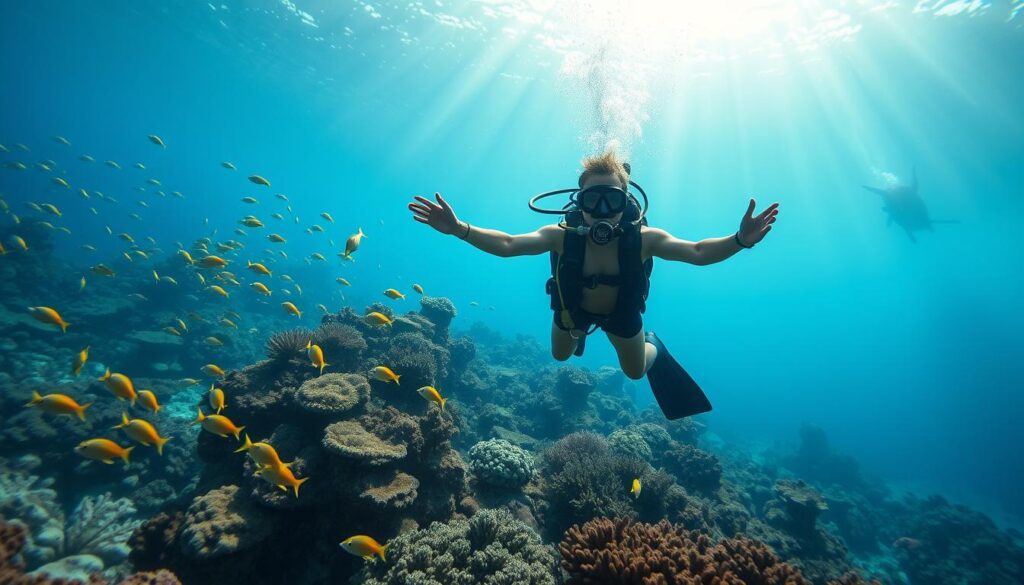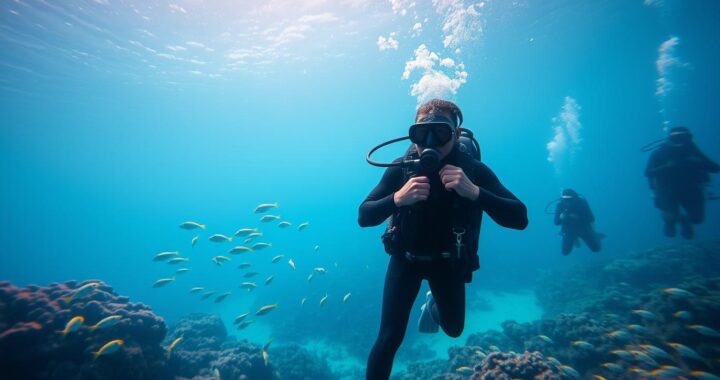Scuba diving lets you see underwater life. But, it has risks. Being safe is very important. By following scuba diving safety tips, you enjoy your dive more. And, you make sure you come back safely.
Key Takeaways
- Always get certified by a reputable training agency.
- Never dive alone; always have a buddy.
- Plan your dive and stick to your plan.
- Conduct thorough pre-dive checks.
- Monitor your air supply diligently.
- Practice proper equalization techniques to avoid discomfort.
- Ascend slowly to prevent decompression sickness.
- Maintain control of your buoyancy throughout the dive.
Get Certified by a Reputable Training Agency
Getting certified by a well-known agency like PADI is important. It makes diving safe and fun. You learn to dive the right way and stay safe underwater. Training agencies help divers feel sure in different diving situations.
Importance of Certification
Certification teaches divers about undersea dangers. It gives them the knowledge of safety and emergency steps. This training cuts down risks and makes diving better.
Choosing the Right Course
Finding the right course matters. Think about your diving skills and goals. For beginners or those wanting advanced skills, picking the right agency is key. The right course makes you good at diving safely.
Always Dive with a Buddy
Dive safety advice says to always dive with a friend. This ensures more safety and help in emergencies. Whether you face issues with your gear or feel uneasy, a buddy is key.
Talk with your dive buddy before going underwater. Discuss signs, how long you’ll dive, how deep, and where you’ll go. This makes underwater talks easier and safer. For tips on being a great dive buddy, check this resource.
Don’t forget a buddy check. Make sure all gear, like the BCD, weights, and air, works well. Stick to the plan but always think safety first. Check on your friend often, at least every 30 seconds, to make sure they’re okay.
Stay close to your dive buddy, close enough to touch. This lets you help fast if needed and talk better. Being a good buddy lowers risks and makes diving fun for both.
- Always dive with a buddy
- Build rapport before diving
- Plan your dive together
- Review hand signals
- Conduct buddy checks
- Stay close to your buddy
- Regularly check on your buddy
Following these steps helps you dive safely. It makes diving fun and safe for everyone involved.
Plan Your Dive and Dive Your Plan
Making a dive plan is key to safe scuba diving. You must set clear goals and pick your dive path. Also, check the weather and be ready for problems. Following your plan makes diving safer and more fun.
Creating a Dive Plan
To start, decide what you want to do underwater. Maybe you want to see a certain reef or work on diving skills. Knowing your goal helps you plan better. Then, figure out your dive path by looking at the area and landmarks. Also, check the water’s temperature, currents, and how clear it is. This helps you plan for any issues.
Factors to Consider
When planning your dive, think about a few key things. How deep and how long you’ll dive are important. They affect how much air you’ll use and your safety stops. Always think about the weather and water currents too. Being ready for emergencies is a must. Know where you can get out if needed and how to talk to your dive buddy. By following these tips, your dive will be safe and fun.
Conduct Pre-Dive Checks
Before you dive into the water, making sure everything is checked is key for safety. Doing these checks can help stop problems with your gear. It’s a big part of staying safe while diving.
When checking your gear, pay attention to these important parts:
- Air Supply: Make sure your air tank is full. Check the valve and the pressure gauge to know how much air you have.
- Regulators: Try out the main and backup regulators. They should give you air easily. Cleaning or changing them before diving can help avoid issues.
- Buoyancy Control Device (BCD): Inflate and deflate your BCD to see if it leaks. Ensure it stays properly inflated. Make sure the straps feel good and secure.
- Overall Gear: Check your mask, fins, wetsuit, and dive computer for any damage. Having extra parts can be very helpful.
These steps can stop problems before they happen. This makes diving safer and more fun. Whether you’re new or experienced, don’t skip checking your gear. It’s how you stay safe while exploring underwater.
Monitor Your Air Supply
Keeping an eye on your air supply is key to safe scuba diving. It helps you enjoy your dive without worry and stay underwater safely.
Using a Pressure Gauge
A pressure gauge is very important for diving safety. Check it often to know how much air you have. This tool is key to managing your air under water.
Many diving computers now have pressure gauges. This makes it easy to keep track of air levels as you dive.
Maintaining a Reserve of Air
Always having extra air is a must, according to diving safety rules. Plan your dives to have air for any surprises. It’s smart to start going up when your tank is one-third full.
This way, you manage your air well and avoid running out underwater.
- Check your pressure gauge frequently
- Start the ascent with adequate reserve
- Use dive computers for real-time monitoring
Knowing how to manage your air makes diving safer and more fun. These safety tips ensure you always come back up safely. It shows being careful and ready matters in all diving.
Practice Proper Equalization Techniques
When you dive, it’s key to balance ear and sinus pressure. If you don’t, it might hurt or cause big problems.
To avoid this, learn things like the Valsalva maneuver. This is where you pinch your nose and blow gently. It makes your ears feel better and stops ear damage.
It’s important to learn these skills with a pro. Following underwater safety guidelines and scuba diving precautions is vital. Being good at these keeps you safe while diving.
| Technique | Method | Benefits |
|---|---|---|
| Valsalva Maneuver | Pinch nose and gently blow | Equalizes pressure, prevents barotrauma |
| Frenzel Maneuver | Tighten throat and use tongue | Effective at greater depths |
| Toynbee Maneuver | Pinch nose and swallow | Alternative method, helps with stubborn pressure |
Ascend Slowly and Safely
One best diving safety practice is to go up slowly and carefully. Going up too fast can cause decompression sickness. This is when nitrogen bubbles form in your blood, which is really bad for you. Divers must take breaks as they go up to let their bodies safely release the gas.
Divers should know and use diving emergency procedures when they go up. This means being ready for anything unexpected and knowing what to do. Having a good emergency plan makes diving safer for everyone.
| Ascent Rate | Recommended Stop Intervals | Health Benefits |
|---|---|---|
| 30 feet per minute | Every 10 feet | Prevents nitrogen bubbles |
| 20 feet per minute | Every 15 feet | Allows safe off-gassing |
| 10 feet per minute | Every 20 feet | Reduces decompression sickness risk |
Maintain Buoyancy Control
To have a safe and fun time underwater, divers must control their buoyancy. They need to know the best diving safety tips. This helps them use less energy, breathe less air, and keep sea life safe. It’s important to float right in the water and move their fins the right way.
Importance of Neutral Buoyancy
Floating just right lets divers move easily in the water. It means they can dive longer without getting tired. By not touching the bottom, they protect underwater life. This is a key rule to dive well and care for the ocean.
Proper Finning Techniques
Knowing how to use fins right helps divers stay steady and go where they want. The right moves make them less tired and move better. Learning to kick in different ways makes swimming through the water smooth and easy.
- Frog Kick: This is a wide move that keeps the water clear, especially in tight spots.
- Flutter Kick: A fast, steady beat perfect for the open sea. It makes divers quick and steady.
Scuba Diving Safety Tips

To dive safely, follow these important scuba diving safety tips. First, make sure you drink enough water. Not drinking enough can cause cramps and make you less alert. Before diving, always check the weather. Bad weather can make it hard to see and increase dangers from currents or waves.
It’s also crucial to know and follow local diving laws. These rules protect you and sea life. Don’t dive into something too challenging. Thinking you can handle more than you can is dangerous.
Following these underwater safety guidelines helps divers stay safe. Getting ready properly, respecting rules, and knowing your limits are important. They make diving fun and safe.
Conclusion
Making these dive safety tips a part of your diving routine is very important. It helps make sure you have fun and stay safe. From getting trained properly to diving with a friend, each step is key. They prepare you for exploring under water.
Planning your dive and double-checking everything before you go are key steps. They help you be ready for what might happen. Checking how much air you have and learning how to balance pressure are also important. They help you stay safe and comfortable while diving.
Going up slowly, controlling your buoyancy, and learning more about diving are big helps for safety. Following these safety tips makes your diving trips safe and rewarding. Always think safety first and keep getting better at diving. Then, you can explore the ocean confidently.
